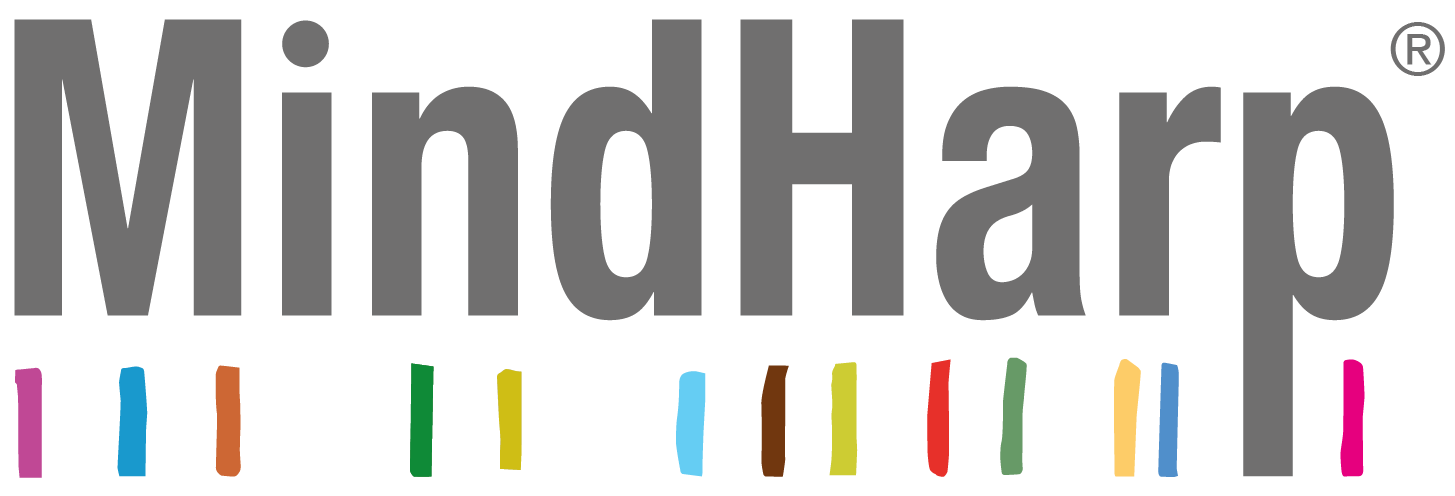MindHarp for Neurologic Music Therapy
Through collaboration and testing with professional music therapists since 2021, MindHarp's impact on a variety of clinical domains has became apparent:
Motor Skills
MindHarp has been found to be useful for improving motor skills and motor coordination, introducing some variety and/or allowing clients with limited mobility to activate a wide range of sounds when positioned correctly.
Cognition
MindHarp can be used to improve attentive behaviour and concentration, as an instrument for attention skills training techniques. It can also be useful for improving other executive function skills, such as starting a task and staying focused until completion, self-monitoring and cause/effect.
Communication
MindHarp is useful when implementing musical exercises aimed to train non-verbal structural communication behaviours, including turn-taking, listening and responding, gesturing or other non-verbal language patterns.
Emotional Regulation
MindHarp is intrinsically an enjoyable device with a very simple principle: a tap produces a specifically designed musical loop. This programme can help in providing a musical experience that can facilitate affective expression and appropriate social interaction. With ‘Musitations’, ’Groovitations’ and now ‘Movitations’ under constant development, there is scope for continual and fresh interactions.
Trial Results
In the first half of 2022, James Lea, Neurologic Music Therapist at Chiltern Music Therapy, initiated a trial of MindHarp at the Royal Buckinghamshire Hospital focusing on 4 unique Patients with diagnosis that included motor neurone disease, tight hemiplegic stroke, complete spinal injury and acquired brain injury for a mixture of 1:1 and group sessions.
Therapeutic aims (‘Smart Goals’) were set for each patient and amongst this patient group, 75% achieved their goals and 25% partially achieved them. At the end of every therapeutic MindHarp intervention detailed progress was monitored and logged (Using the ‘Music Therapy Star’).
Average outcome Star ratings showed improvement in all areas.
In addition, staff reported that interaction with MindHarp has improved and helped to facilitate the patient’s engagement in other sessions due to an improvement in all domains.
Mood ratings were also taken, pre and post session. 100% of patients accessing MindHarp improved in mood following sessions. No negative impacts on mood were evidenced.
Aphasia-friendly discharge questionnaires were also carried out with patients who had access MindHarp and ALL patients agreed that MindHarp had supported them in the following*:
Reduced stress/anxiety - Strongly Agree
Enhanced Rehab Engagement - Agree
Helped Express Feelings - Agree
Improved Mood - Strongly Agree
*[on a 5 point scale: Strongly Disagree - Disagree - Neither Agree or Disagree - Agree - Strongly Agree]
In 2023 MindHarp has initiated a relationship with the RHN (Royal Hospital fo Neuro Disability) and as of July 2023, begun a development programme of technical, product and sound design alongside their music therapy team.
This is exciting as we can now begin to refine and evolve activities for patients and therapists collaboratively, building on our experiences so far.
If you are a music therapist or commission projects in this area please contact us.
We are very committed to support health outcomes with MindHarp and are seeking more collaborations and programmes.
Testimonials
“MindHarp helps me block out negative thoughts that I don’t want to listen to, It helps me sleep better, It allows me to unwind and feel physically relaxed and it takes me to a better place"
Patient with motor neurone disease
Faculty & Staff at Harrisburg University of Science and Technology, Philadelphia, Pennsylvania, United States
“As a music therapist, I have found the MindHarp application to be highly useful and a wonderful tool in my work. The ability to integrate technology, particularly one that is interactive and colourful, has been such a wonderful addition to my interactions with my clients. I hope that the field of music therapy will explore the uses of this tool in our work.”
Janelle Junkin, PhD, MT-BC
Faculty & Staff at Harrisburg University of Science and Technology, Philadelphia, Pennsylvania, United States
“The MindHarp app has proven to be a very useful tool for my work as a music therapist. I found it to be engaging for young children and have been using it to support the development of social skills and expression. Attending the course with Mark and Stewart was very beneficial, as they offered their insight into creating the app, as well as providing ideas and suggestions of how to use the app with different populations.”
Elena Konstantinidi, Neurologic Music Therapist
Deputy Designated Safeguarding Lead, Chiltern Music Therapy
“MindHarp is an app that invites you to explore and create different patterns and sequences of sounds…MindHarp’s accessibility removes the anxiety and pressure of making music by just pressing a few buttons. Users become so in tune with it that they will form sound patterns for endless hours!”
Mallika Singh, intern completing a Bachelor of Science in Music Therapy at Duquesne University in Pittsburgh, PA
If you are a music therapist or commission projects in this area please contact us.
We are very committed to support health outcomes with MindHarp and are seeking more collaborations and programmes.


